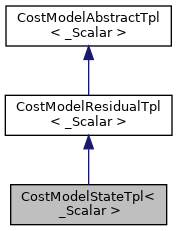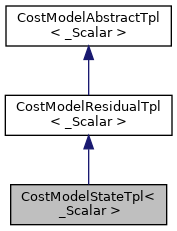State cost. More...
#include <crocoddyl/multibody/costs/state.hpp>


Public Types | |
| typedef ActivationModelAbstractTpl< Scalar > | ActivationModelAbstract |
| typedef CostModelResidualTpl< Scalar > | Base |
| typedef CostDataAbstractTpl< Scalar > | CostDataAbstract |
| typedef MathBaseTpl< Scalar > | MathBase |
| typedef MathBase::MatrixXs | MatrixXs |
| typedef ResidualModelStateTpl< Scalar > | ResidualModelState |
| typedef StateMultibodyTpl< Scalar > | StateMultibody |
| typedef MathBase::VectorXs | VectorXs |
 Public Types inherited from CostModelResidualTpl< _Scalar > Public Types inherited from CostModelResidualTpl< _Scalar > | |
| typedef ActivationModelAbstractTpl< Scalar > | ActivationModelAbstract |
| typedef CostModelAbstractTpl< Scalar > | Base |
| typedef CostDataAbstractTpl< Scalar > | CostDataAbstract |
| typedef CostDataResidualTpl< Scalar > | Data |
| typedef DataCollectorAbstractTpl< Scalar > | DataCollectorAbstract |
| typedef MathBaseTpl< Scalar > | MathBase |
| typedef MathBase::MatrixXs | MatrixXs |
| typedef ResidualModelAbstractTpl< Scalar > | ResidualModelAbstract |
| typedef MathBase::VectorXs | VectorXs |
 Public Types inherited from CostModelAbstractTpl< _Scalar > Public Types inherited from CostModelAbstractTpl< _Scalar > | |
| typedef ActivationModelAbstractTpl< Scalar > | ActivationModelAbstract |
| typedef ActivationModelQuadTpl< Scalar > | ActivationModelQuad |
| typedef CostDataAbstractTpl< Scalar > | CostDataAbstract |
| typedef DataCollectorAbstractTpl< Scalar > | DataCollectorAbstract |
| typedef MathBaseTpl< Scalar > | MathBase |
| typedef MathBase::MatrixXs | MatrixXs |
| typedef ResidualModelAbstractTpl< Scalar > | ResidualModelAbstract |
| typedef StateAbstractTpl< Scalar > | StateAbstract |
| typedef MathBase::VectorXs | VectorXs |
Public Member Functions | |
| CostModelStateTpl (boost::shared_ptr< typename Base::StateAbstract > state) | |
| Initialize the state cost model. More... | |
| CostModelStateTpl (boost::shared_ptr< typename Base::StateAbstract > state, boost::shared_ptr< ActivationModelAbstract > activation) | |
| Initialize the state cost model. More... | |
| CostModelStateTpl (boost::shared_ptr< typename Base::StateAbstract > state, boost::shared_ptr< ActivationModelAbstract > activation, const std::size_t nu) | |
| Initialize the state cost model. More... | |
| CostModelStateTpl (boost::shared_ptr< typename Base::StateAbstract > state, boost::shared_ptr< ActivationModelAbstract > activation, const VectorXs &xref) | |
| Initialize the state cost model. More... | |
| CostModelStateTpl (boost::shared_ptr< typename Base::StateAbstract > state, boost::shared_ptr< ActivationModelAbstract > activation, const VectorXs &xref, const std::size_t nu) | |
| Initialize the state cost model. More... | |
| CostModelStateTpl (boost::shared_ptr< typename Base::StateAbstract > state, const std::size_t nu) | |
| Initialize the state cost model. More... | |
| CostModelStateTpl (boost::shared_ptr< typename Base::StateAbstract > state, const VectorXs &xref) | |
| Initialize the state cost model. More... | |
| CostModelStateTpl (boost::shared_ptr< typename Base::StateAbstract > state, const VectorXs &xref, const std::size_t nu) | |
| Initialize the state cost model. More... | |
| virtual void | calcDiff (const boost::shared_ptr< CostDataAbstract > &data, const Eigen::Ref< const VectorXs > &x, const Eigen::Ref< const VectorXs > &u) |
| Compute the derivatives of the state cost. More... | |
 Public Member Functions inherited from CostModelResidualTpl< _Scalar > Public Member Functions inherited from CostModelResidualTpl< _Scalar > | |
| CostModelResidualTpl (boost::shared_ptr< typename Base::StateAbstract > state, boost::shared_ptr< ActivationModelAbstract > activation, boost::shared_ptr< ResidualModelAbstract > residual) | |
| Initialize the residual cost model. More... | |
| CostModelResidualTpl (boost::shared_ptr< typename Base::StateAbstract > state, boost::shared_ptr< ResidualModelAbstract > residual) | |
| Initialize the residual cost model. More... | |
| virtual void | calc (const boost::shared_ptr< CostDataAbstract > &data, const Eigen::Ref< const VectorXs > &x) |
| Compute the residual cost based on state only. More... | |
| virtual void | calc (const boost::shared_ptr< CostDataAbstract > &data, const Eigen::Ref< const VectorXs > &x, const Eigen::Ref< const VectorXs > &u) |
| Compute the residual cost. More... | |
| virtual void | calcDiff (const boost::shared_ptr< CostDataAbstract > &data, const Eigen::Ref< const VectorXs > &x) |
| Compute the derivatives of the residual cost with respect to the state only. More... | |
| virtual boost::shared_ptr< CostDataAbstract > | createData (DataCollectorAbstract *const data) |
| Create the residual cost data. | |
| virtual void | print (std::ostream &os) const |
| Print relevant information of the cost-residual model. More... | |
 Public Member Functions inherited from CostModelAbstractTpl< _Scalar > Public Member Functions inherited from CostModelAbstractTpl< _Scalar > | |
| CostModelAbstractTpl (boost::shared_ptr< StateAbstract > state, boost::shared_ptr< ActivationModelAbstract > activation) | |
| Initialize the cost model. More... | |
| CostModelAbstractTpl (boost::shared_ptr< StateAbstract > state, boost::shared_ptr< ActivationModelAbstract > activation, boost::shared_ptr< ResidualModelAbstract > residual) | |
| Initialize the cost model. More... | |
| CostModelAbstractTpl (boost::shared_ptr< StateAbstract > state, boost::shared_ptr< ActivationModelAbstract > activation, const std::size_t nu) | |
| Initialize the cost model. More... | |
| CostModelAbstractTpl (boost::shared_ptr< StateAbstract > state, boost::shared_ptr< ResidualModelAbstract > residual) | |
| Initialize the cost model. More... | |
| CostModelAbstractTpl (boost::shared_ptr< StateAbstract > state, const std::size_t nr) | |
| Initialize the cost model. More... | |
| CostModelAbstractTpl (boost::shared_ptr< StateAbstract > state, const std::size_t nr, const std::size_t nu) | |
| Initialize the cost model. More... | |
| const boost::shared_ptr< ActivationModelAbstract > & | get_activation () const |
| Return the activation model. | |
| std::size_t | get_nu () const |
| Return the dimension of the control input. | |
| template<class ReferenceType > | |
| ReferenceType | get_reference () |
| Return the cost reference. | |
| const boost::shared_ptr< ResidualModelAbstract > & | get_residual () const |
| Return the residual model. | |
| const boost::shared_ptr< StateAbstract > & | get_state () const |
| Return the state. | |
| template<class ReferenceType > | |
| void | set_reference (ReferenceType ref) |
| Modify the cost reference. | |
Public Attributes | |
| EIGEN_MAKE_ALIGNED_OPERATOR_NEW typedef _Scalar | Scalar |
 Public Attributes inherited from CostModelResidualTpl< _Scalar > Public Attributes inherited from CostModelResidualTpl< _Scalar > | |
| EIGEN_MAKE_ALIGNED_OPERATOR_NEW typedef _Scalar | Scalar |
 Public Attributes inherited from CostModelAbstractTpl< _Scalar > Public Attributes inherited from CostModelAbstractTpl< _Scalar > | |
| EIGEN_MAKE_ALIGNED_OPERATOR_NEW typedef _Scalar | Scalar |
Protected Member Functions | |
| virtual void | get_referenceImpl (const std::type_info &ti, void *pv) |
| Return the state reference. | |
| virtual void | set_referenceImpl (const std::type_info &ti, const void *pv) |
| Modify the state reference. | |
Protected Attributes | |
| boost::shared_ptr< ActivationModelAbstract > | activation_ |
| Activation model. | |
| std::size_t | nu_ |
| Control dimension. | |
| boost::shared_ptr< ResidualModelAbstract > | residual_ |
| Residual model. | |
| boost::shared_ptr< StateAbstract > | state_ |
| State description. | |
| VectorXs | unone_ |
| No control vector. | |
 Protected Attributes inherited from CostModelResidualTpl< _Scalar > Protected Attributes inherited from CostModelResidualTpl< _Scalar > | |
| boost::shared_ptr< ActivationModelAbstract > | activation_ |
| Activation model. | |
| std::size_t | nu_ |
| Control dimension. | |
| boost::shared_ptr< ResidualModelAbstract > | residual_ |
| Residual model. | |
| boost::shared_ptr< StateAbstract > | state_ |
| State description. | |
| VectorXs | unone_ |
| No control vector. | |
 Protected Attributes inherited from CostModelAbstractTpl< _Scalar > Protected Attributes inherited from CostModelAbstractTpl< _Scalar > | |
| boost::shared_ptr< ActivationModelAbstract > | activation_ |
| Activation model. | |
| std::size_t | nu_ |
| Control dimension. | |
| boost::shared_ptr< ResidualModelAbstract > | residual_ |
| Residual model. | |
| boost::shared_ptr< StateAbstract > | state_ |
| State description. | |
| VectorXs | unone_ |
| No control vector. | |
State cost.
This cost function defines a residual vector as \(\mathbf{r}=\mathbf{x}\ominus\mathbf{x}^*\), where \(\mathbf{x},\mathbf{x}^*\in~\mathcal{X}\) are the current and reference states, respectively, which belong to the state manifold \(\mathcal{X}\). Note that the dimension of the residual vector is obtained from StateAbstract::get_ndx().
Both cost and residual derivatives are computed analytically. For the computation of the cost Hessian, we use the Gauss-Newton approximation, e.g. \(\mathbf{l_{xx}} = \mathbf{l_{x}}^T \mathbf{l_{x}} \).
As described in CostModelResidualTpl(), the cost value and its derivatives are calculated by calc and calcDiff, respectively.
CostModelResidualTpl, calc(), calcDiff(), createData() | CostModelStateTpl | ( | boost::shared_ptr< typename Base::StateAbstract > | state, |
| boost::shared_ptr< ActivationModelAbstract > | activation, | ||
| const VectorXs & | xref, | ||
| const std::size_t | nu | ||
| ) |
Initialize the state cost model.
| [in] | state | State of the multibody system |
| [in] | activation | Activation model |
| [in] | xref | Reference state |
| [in] | nu | Dimension of the control vector |
| CostModelStateTpl | ( | boost::shared_ptr< typename Base::StateAbstract > | state, |
| boost::shared_ptr< ActivationModelAbstract > | activation, | ||
| const VectorXs & | xref | ||
| ) |
Initialize the state cost model.
The default nu value is obtained from StateAbstractTpl::get_nv().
| [in] | state | State of the multibody system |
| [in] | activation | Activation model |
| [in] | xref | Reference state |
| CostModelStateTpl | ( | boost::shared_ptr< typename Base::StateAbstract > | state, |
| const VectorXs & | xref, | ||
| const std::size_t | nu | ||
| ) |
Initialize the state cost model.
We use ActivationModelQuadTpl as a default activation model (i.e. \(a=\frac{1}{2}\|\mathbf{r}\|^2\)).
| [in] | state | State of the multibody system |
| [in] | xref | Reference state |
| [in] | nu | Dimension of the control vector |
| CostModelStateTpl | ( | boost::shared_ptr< typename Base::StateAbstract > | state, |
| const VectorXs & | xref | ||
| ) |
Initialize the state cost model.
We use ActivationModelQuadTpl as a default activation model (i.e. \(a=\frac{1}{2}\|\mathbf{r}\|^2\)). The default nu value is obtained from StateAbstractTpl::get_nv().
| [in] | state | State of the multibody system |
| [in] | xref | Reference state |
| CostModelStateTpl | ( | boost::shared_ptr< typename Base::StateAbstract > | state, |
| boost::shared_ptr< ActivationModelAbstract > | activation, | ||
| const std::size_t | nu | ||
| ) |
Initialize the state cost model.
The default reference state is obtained from StateAbstractTpl::zero().
| [in] | state | State of the multibody system |
| [in] | activation | Activation model |
| [in] | nu | Dimension of the control vector |
| CostModelStateTpl | ( | boost::shared_ptr< typename Base::StateAbstract > | state, |
| const std::size_t | nu | ||
| ) |
Initialize the state cost model.
We use ActivationModelQuadTpl as a default activation model (i.e. \(a=\frac{1}{2}\|\mathbf{r}\|^2\)). The default reference state is obtained from StateAbstractTpl::zero().
| [in] | state | State of the multibody system |
| [in] | nu | Dimension of the control vector |
| CostModelStateTpl | ( | boost::shared_ptr< typename Base::StateAbstract > | state, |
| boost::shared_ptr< ActivationModelAbstract > | activation | ||
| ) |
Initialize the state cost model.
The default state reference is obtained from StateAbstractTpl::zero(), and nu from StateAbstractTpl::get_nv().
| [in] | state | State of the multibody system |
| [in] | activation | Activation model |
|
explicit |
Initialize the state cost model.
We use ActivationModelQuadTpl as a default activation model (i.e. \(a=\frac{1}{2}\|\mathbf{r}\|^2\)). The default state reference is obtained from StateAbstractTpl::zero() and nu from StateAbstractTpl::get_nv().
| [in] | state | State of the multibody system |
|
virtual |
Compute the derivatives of the state cost.
| [in] | data | State cost data |
| [in] | x | State point \(\mathbf{x}\in\mathbb{R}^{ndx}\) |
| [in] | u | Control input \(\mathbf{u}\in\mathbb{R}^{nu}\) |
Reimplemented from CostModelResidualTpl< _Scalar >.